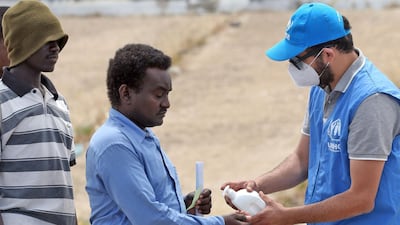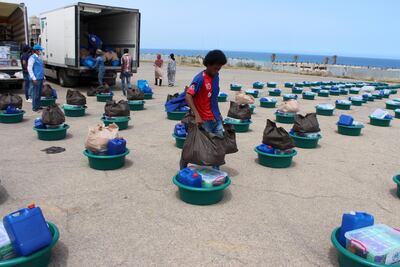Seven UN agencies on Wednesday called for a ceasefire in Libya to try to stop the spread of the coronavirus.
They said the international community “must not turn a blind eye to the conflict” in Libya, where 64 cases of Covid-19 have been confirmed.
The heads of the agencies said the confirmed cases included three deaths and were reported in different parts of Libya, showing that “the risk of further escalation of the outbreak is very high".
They said the conflict was having a “catastrophic effect on civilians, including migrants and refugees, across the country”.
The leaders backed the call by UN Secretary General Antonio Guterres for a global ceasefire to tackle the pandemic.
The agencies asked donors to “continue to show their generosity and stand by the people of Libya in their quest for peace and in this moment of great need”.
Libya has been in turmoil since 2011, when long-time dictator Muammar Qaddafi was toppled. The country has been split between rival administrations in the east and the west.
The signatories to the statement included UN humanitarian chief Mark Lowcock, refugee head Filippo Grandi and World Health Organisation director general Tedros Adhanom Ghebreyesus.
The others were Unicef executive director Henrietta Fore, UN Population Fund executive director Natalia Kanem, World Food Programme executive director David Beasley, and International Organisation for Migration director general Antonio Vitorino.
They said the situation for many migrants and refugees “is especially alarming,” with more than 3,200 people intercepted at sea since January having been returned to Libya.
The UN has repeatedly said the country is not safe and they should not be returned to detention.
“Many end up in one of the 11 official detention centres,” they said. “Others are taken to facilities or unofficial detention centres to which the humanitarian community does not have access.”
The agencies said the UN has verified 113 cases of “grave violations” in Libya over the past year.
Since January, they said, “at least 15 attacks have damaged health facilities and ambulances, and injured healthcare workers”.
As a result of the coronavirus spreading, most cities in Libya “are facing shortages of basic food items coupled with an increase in prices", the agencies said.
They urged continued support for food availability, “so that this health crisis does not worsen by becoming a food crisis".
The agencies also urged protection for water supplies, which have been damaged during fighting. Water is crucial for basic virus prevention measures including hand washing.
Humanitarian groups reported 851 incidents in which their personnel and aid were prevented from entering Libya or moving within the country.


